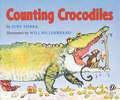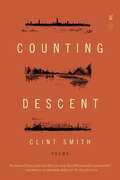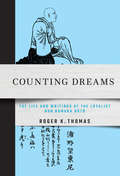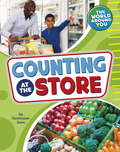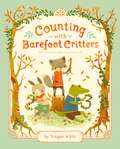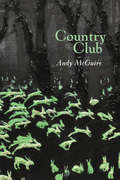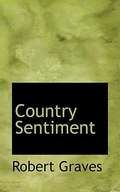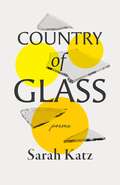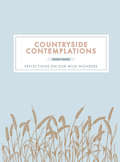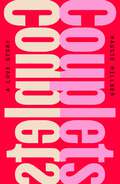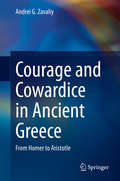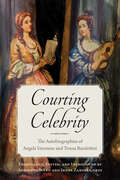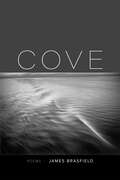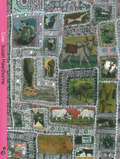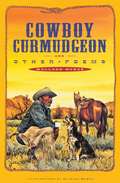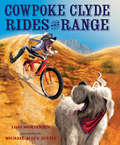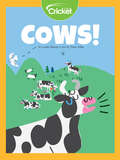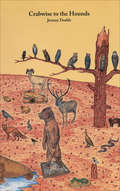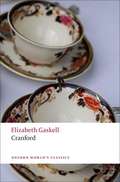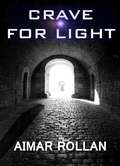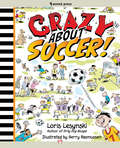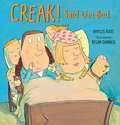- Table View
- List View
Counting Descent
by Clint SmithClint Smith's debut poetry collection, Counting Descent, is a coming of age story that seeks to complicate our conception of lineage and tradition. “Do you know what it means for your existence to be defined by someone else’s intentions?” Smith explores the cognitive dissonance that results from belonging to a community that unapologetically celebrates black humanity while living in a world that often renders blackness a caricature of fear. His poems move fluidly across personal and political histories, all the while reflecting on the social construction of our lived experiences. Smith brings the reader on a powerful journey forcing us to reflect on all that we learn growing up, and all that we seek to unlearn moving forward.
Counting Dreams: The Life and Writings of the Loyalist Nun Nomura Bōtō
by Roger K. ThomasCounting Dreams tells the story of Nomura Bōtō, a Buddhist nun, writer, poet, and activist who joined the movement to oppose the Tokugawa Shogunate and restore imperial rule. Banished for her political activities, Bōtō was imprisoned on a remote island until her comrades rescued her in a dramatic jailbreak, spiriting her away under gunfire. Roger K. Thomas examines Bōtō's life, writing, and legacy, and provides annotated translations of two of her literary diaries, shedding light on life and society in Japan's tumultuous bakumatsu period and challenging preconceptions about women's roles in the era.Thomas interweaves analysis of Bōtō's poetry and diaries with the history of her life and activism, examining their interrelationship and revealing how she brought two worlds—the poetic and the political—together. Counting Dreams illustrates Bōtō's significant role in the loyalist movement, depicting the adventurous life of a complex woman in Japan on the cusp of the Meiji Restoration.
Counting at the Store (The World Around You)
by Christianne JonesPiles of tart apples. Cans of delicious soup. Rows of crunchy carrots. The grocery store is full of tasty foods and other items to count. The interactive, rhyming text and colorful photographs will have young learners counting along with every page in this picture book.
Counting with Barefoot Critters
by Teagan WhiteWhat is a day of counting with Barefoot Critters?ReadingMaking pancakesHelping friendsExploringSwimmingPlaying piratesLearning about numbers!Join this adorable cast of animal characters as they explore numbers and counting over the course of a day, having fun at all stops along the way.
Country Club
by Andy McguireA lyrical wilderness of power, wealth, leisure and desire, the poems of Country Club freewheel across state lines with panache and flagrant feeling. In this bold debut from Andy McGuire, all passions - even unpleasant ones - stare down the barrel of a world in which freedom is the fifty-first state, and love is the eleventh province. The manatee wades out of the water and roars at the sightseersThat one of them owes him a drink.From the beach below the boardwalk, cock-a-doodle-do!What about a Christmas bowlcut over by the mangrove manatees!Because in Florida there are FloridiansAnd they are born Floridians at large.Every motionCan't stop its own ocean.The oceans' motions make mistakes.Some of the dying are unspeakableIn their thinness, poorly disguised meat mannequins.The mosquitoes are so bigThey bleed you like a pig.Being eaten alive is an acquired taste.
Country of Glass: Poems
by Sarah KatzCountry of Glass is the debut poetry collection from Sarah Katz, who offers an exploration of the concept of precariousness as it applies to bodies, families, countries, and whole societies. Katz employs themes of illness, disability, war, and survival within the contexts of family history and global historical events. The collection moves through questions about identity, storytelling, displacement, and trauma, constructing an overall narrative about what it means to love while trying to survive. The poems in this book—which take the form of free verse, prose poems, sestinas, and erasures—attempt to address human fragility and what resilience looks like in a world where so much is uncertain.
Countryside Contemplations: Reflections on Our Wild Wonders
by Trigger'In the spring, at the end of the day, you should smell like dirt.' - Margaret Atwood. This beautifully packaged book offers a rare opportunity to slow down, step back and to receive the natural restorative power of nature through its beautiful, evocative passages and quotes inspired by the countryside. The contemplative words will transport you to a space of quiet reflection as you simply sit and be. 'Soon will the high Midsummer prompts come in Soon will the musk carnations break and swell Soon shall we have gold-dusted snapdragon Sweet-William with his homely cottage-smell And stocks in fragrant blow Roses that down the alleys shine afar And open, jasmine-muffled lattices'...Mathew Arnold, Thyrisis: A Monody to Commemorate the Author's Friend, Arthur Hugh Clough
Couplets: A Love Story
by Maggie Millner“An astounding debut.”—Adrienne Raphel, The New York Times Book ReviewA dazzling love story in poems about one woman’s coming-out, coming-of-age, and coming undoneA woman lives an ordinary life in Brooklyn. She has a boyfriend. They share a cat. She writes poems in the prevailing style. She also has dreams: of being seduced by a throng of older women, of kissing a friend in a dorm-room closet. But the dreams are private, not real.One night, she meets another woman at a bar, and an escape hatch swings open in the floor of her life. She falls into a consuming affair—into queerness, polyamory, kink, power and loss, humiliation and freedom, and an enormous surge of desire that lets her leave herself behind.Maggie Millner’s captivating, seductive debut is a love story in poems that explores obsession, gender, identity, and the art and act of literary transformation. In rhyming couplets and prose vignettes, Couplets chronicles the strictures, structures, and pitfalls of relationships—the mirroring, the pleasing, the small jealousies and disappointments—and how the people we love can show us who we truly are."An endlessly inventive, wise, exhilarating book.”—Garth Greenwell, author of Cleanness and What Belongs to You
Courage and Cowardice in Ancient Greece: From Homer to Aristotle
by Andrei G. ZavaliyThe book offers the first comprehensive account of the debate on true courage as it was raging in ancient Greece, from the times when the immensely influential Homeric epics, the Iliad and the Odyssey, were composed, to the period of the equally influential author, Aristotle. The many voices that contribute to this debate include poets, authors of ancient dramas and comedies, historians, politicians and philosophers. The book traces the origin of the earliest ideal of a courageous hero in the epic poems of Homer (8th century BCE), and faithfully records its transformations in later authors, which range from an emphatic denial of the Homeric standards of courage (as in comedies of Aristophanes and some Dialogues of Plato) to the strong revisionist tendencies of Aristotle, who attempts to restore genuine courage to its traditional place as an exclusively martial, male virtue.Without attempting to cover the whole of the Western history, the book is able to explore the most important primary Greek sources on the subject matter in greater details, and provide the reader with a comprehensive picture of the changes in both popular and philosophical conceptualizations of the standards of courage from the Archaic period to the middle of the 4th century BCE. A deeper understanding of the history of the debate on courage should help to shape the modern discussions as well, as it becomes obvious that many of the questions on courage and cowardice that are still raised by the contemporary authors from different fields, have been thoroughly considered during the early stages of Greek culture. The book seeks to undermine a common stereotype of a single, unified view on courage and cowardice in Ancient Greece and shows that the current debates on what constitutes genuine courageous character can be traced to the various direct and indirect discussions on this subject matter by the ancient authorities.
Courting Celebrity: The Autobiographies of Angela Veronese and Teresa Bandettini (Toronto Italian Studies)
by Adrienne Ward Irene Zanini-CordiIn 1826 Angela Veronese, a gardener’s daughter, wrote and published the first modern autobiography by an Italian woman. Veronese’s account focuses on her unique experience as a peasant girl who came of age among the Venetian elite, and details how she attained a certain renown in and out of Italy by improvising, writing, and publishing her own lyrics. Courting Celebrity is a bilingual annotated edition of Veronese’s autobiography. To better elucidate Veronese’s thinking, the book includes the autobiographical writing of another contemporary Italian poet, Teresa Bandettini, a well-known Tuscan poet-improviser. The book offers a substantial sample of Veronese’s poems, translated and in the original. These compositions, together with detailed bibliographical documentation, point to the success of Veronese’s autobiographical enterprise and offer an unparalleled view of both high society and popular culture at the time. Courting Celebrity illustrates women’s practice in two key literary genres, poetry and autobiography, and illuminates the strategies of women’s self-fashioning and pursuit of celebrity.
Cove: Poems
by James BrasfieldIn Cove, the compulsive intensity with which James Brasfield seeks to capture a fleeting moment’s imagery, “to choose a song sown / for the moment,” imbues his poems with a sense of urgency and movement. By exploring the translation of the sensory world into art, Brasfield faces the passage of time and the transitory nature of experience, thought, and memory. The poems find “angles of vision” to rescue a present instant in its essential fluidity, to go deep enough, without distraction, into the moment and reveal touchstones of being. Throughout Cove, Brasfield embraces the enduring effort to create an experience of language that is rich, lasting, and true, as life speeds into and through the future.
Cow
by Susan HawthorneAn intriguing approach to the rewriting of myth, this poetry collection journeys through the history of languages and symbolic traditions. Through main character Queenie, a cow of many abilities, these poems delve into the creation of the universe as Queenie fashions the galaxies and travels through the sky as a herd of stars. Delightful and surprising, this compilation draws on the Greek lyric tradition of Sappho as well as on South India's Sangam poetry tradition to provide a balanced work of both humor and melancholy.
Cowboy Curmudgeon And Other Poems
by Wallace Mcrae Clinton McraeWally McRae, a regularly featured performer at the annual Cowboy Poetry Gathering in Elko, has performed on a syndicated television program and at the National Cowboy Hall of Fame. He is the first cowboy poet to be granted a National Heritage Award. This book contains 94 of his poems, including such classics as "Reincarnation," along with 40 new poems published for the first time.
Cowley's Essays
by Abraham CowleyThe calm spirit of Cowley's "Essays" was in all his life. As he tells us in his Essay "On Myself," even when he was a very young boy at school, instead of running about on holidays and playing with his fellows, he was wont to steal from them and walk into the fields, either alone with a book or with some one companion, if he could find any of the same temper.
Cowpoke Clyde Rides the Range (Cowpoke Clyde)
by Lori Mortensen Michael Allen AustinCowpoke Clyde is plumb confused. An ad in his favorite catalog says he oughta buy a bike. But why should he do that? After all, he’s got a horse. Still, a bike wouldn’t buck or bite, and he wouldn’t have to feed it. He orders one, and when it comes, he mounts up and sets right off, wibble-wobblin’ down the road. Good thing he’s got his trusty friend Dawg to look out for him. Turns out learning to ride a bike is just a tad bit harder than he thought! With its rip-roaring rhyming text and turn-the-page revelations, this book is pure read-aloud fun.
Cows!
by Leslie SharpeCows in the meadow, cows on the hill, cows peeking over the windowsill! Babies and toddlers will enjoy this funny rhyming poem about the silly things cows do on their farm.
Crabwise to the Hounds
by Jeramy DoddsWinner of the Trillium Book Award for Poetry. Nominated for the Griffin Poetry Prize and the Gerald Lampert Award.With cameos by jackalopes, Glenn Gould, homemade spaceships and Carl Linnaeus, these poems are remarkable for their technical agility and their restless inventiveness. There's an elegance here that matches Dodds' impulse to challenge the reader with fresh metaphor and astonishing phrasing; the formal ambitions of many of the poems in Crabwise to the Hounds are balanced by an inclination towards wordplay and a bright musicality. Humorous at times, yet always handled with consummate craft, these poems invoke historical figures like Hiram Bingham and Ho Chi Minh even as they traverse a poetic landscape that includes telephone-game-style translations, interpretive dance poems on historic paintings and carnivalesque jaunts into a natural world overrun with mules, Alsatians, lions, and motorcycle-sized-deer.
Cranford
by Elizabeth Cleghorn GaskellA portrait of the residents of an English country town in the mid nineteenth century, Cranford relates the adventures of Miss Matty and Miss Deborah, two middle-aged spinster sisters striving to live with dignity in reduced circumstances. Through a series of vignettes, Elizabeth Gaskell portrays a community governed by old-fashioned habits and dominated by friendships between women. Her wry account of rural life is undercut, however, by tragedy in its depiction of such troubling events as Matty's bankruptcy, the violent death of Captain Brown or the unwitting cruelty of Peter Jenkyns. Written with acute observation, Cranford is by turns affectionate, moving and darkly satirical.
Crash's Law: Poems
by Karen VolkmanSelected by Heather McHugh as 1995 winner in the National Poetry Series, Volkman's debut collection retells myths and fairy tales in a modern, abstract voice to reveal essential, nearly private messages. In "Persephone at Home," for example, the abducted goddess is ironic and cold in accepting her fate: "I'll give no prince to this kingdom./ That thing is dead." The collection's pared-down yet inventive voice often surprises with exact rightness, as in "Reflections": "What good is a sky, I might have asked, if it will not give us new/ blue distance, if it will/ only throw our loss back at us, shabby lens." Like the girl in "Science and Industry" who chooses to play with Legos rather than "sweet-limbed cherry-cheeked/ dolls," Volkman chooses an angular, rigorously constructed style that informs her work with an exciting confidence, even though at times substance or a more radical exploration of meaning is sacrificed to style. Despite this occasional hollow effect, Volkman forcefully fuses ancient story and contemporary scene to frame an ironic and deflected commentary on modern emotional life.
Crave for light
by Aimar RollanFor the Sufis, there is no greater punishment than to feel nostalgic for being separated from the source, nor greater reward than to feel attached to it. Thus, the emotion that predominates in this work is nostalgia, and its consequent yearning to break free from it and merge into Unity. This is the story of a fall, a loss, a recovery and an ascension. It is the story of a search for light from the deepest darkness. It is written in poetic prose, with brief fragments independent of each other, which can be read in isolation, but that have a certain cohesion, since each fragment carries, or craves, a little more light than the previous one. It is about a man who has lost his light, but who harbors a faint flash of memory of her. That transience tortures his mind and makes him embark on a path of ascension to recover that precious treasure. It goes through all phases of depression, sadness and melancholy, rejoicing in its loss. In the initial phases he identifies that lost light with the love of a woman, with the love of many women who are one for him; and the loss of that love is the germ of his melancholy. As he progresses in his tribulation, he recognizes that this yearned light belongs to something more subtle and deep, to the realm of his soul... He recognizes that emotional pain comes from feeling separated from the primordial source. This work is written in a somber language, but in its background aims to convey beauty, hope and joy.
Crazy About Soccer
by Loris Lesynski Gerry RasmussenThis new collection of poems by Loris Lesynski captures the joys, thrills, and challenges of one of the most popular sports in the schoolyard today. Rhythmic, funny verses reflect the game's energy while offering sound suggestions for proper play.
Creak! Said the Bed
by Phyllis RootIT'S THE MIDDLE OF THE NIGHT. Everyone is cozy and tucked up in bed when out of the darkness, SQUEAK, says the door. Mama's eyes fly open. Who's out of bed? Is it Evie? Ivy? Little Mo? On this stormy night in their little house, only Papa keeps snoring away -- Snurfle, Snark -- unaware of the wild weather outside and the growing number of nervous bedmates inside. Will anything wake Papa? CREAK, said the bed. A preposterous series of events takes readers barreling toward bedlam in this delicious read-aloud.
